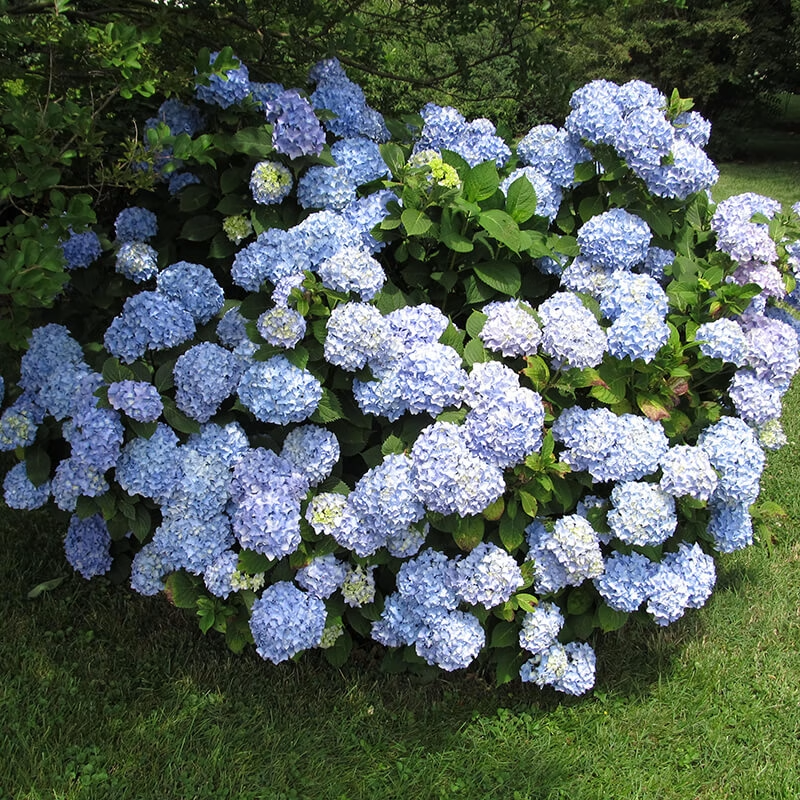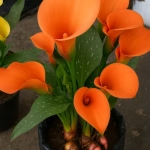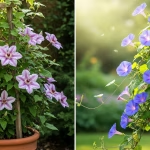Why they shine in shade: While technically grown for foliage, caladiums provide incredible color impact that rivals any flower, with heart-shaped leaves in stunning combinations.
Key Features
- Leaf colors: Pink, red, white, green combinations
- Height: 12-30 inches
- Season: Spring through fall in warm climates
- Growth: Tuberous perennials, annual in cold climates
Care Instructions
- Light: Partial shade to full shade
- Soil: Rich, moist, well-draining
- Water: Consistent moisture during growing season
- Temperature: Warm soil required (70°F+)
Popular Varieties
- ‘Candidum’: Classic white with green veining
- ‘Pink Beauty’: Hot pink with green margins
- ‘Red Flash’: Deep red centers with green edges
4. Coleus (Plectranthus scutellarioides)
Why they’re shade garden stars: Coleus provides incredible foliage color and texture, creating the visual impact of flowers while thriving in low-light conditions.
Key Features
- Foliage colors: Purple, red, yellow, green, pink, burgundy, lime
- Patterns: Solid, variegated, spotted, edged
- Height: 6 inches to 3 feet
- Texture: Serrated, smooth, or ruffled leaves
Growing Success
- Light: Partial shade to full shade (some varieties tolerate more sun)
- Soil: Moist, well-draining, fertile
- Pinching: Remove flower spikes to maintain foliage color
- Propagation: Easily rooted from cuttings
Top Varieties
- ‘Kong’ Series: Giant leaves up to 8 inches across
- ‘Wizard’ Series: Compact, uniform growth habit
- ‘Rainbow’ Series: Multiple colors in single plants
5. Torenia (Torenia fournieri)
Why they’re shade garden gems: Known as “wishbone flowers,” torenia produces masses of small, snapdragon-like blooms that add delicate beauty to shaded spaces.
Key Features
- Colors: Purple, blue, pink, white, yellow, often bi-colored
- Size: Compact, 6-12 inches tall and wide
- Bloom time: Continuous from spring to frost
- Flower shape: Two-lipped blooms with distinctive markings
Growing Requirements
- Light: Partial shade to full shade
- Soil: Moist, well-draining, rich in organic matter
- Climate: Cool to moderate temperatures preferred
- Maintenance: Low maintenance, self-cleaning flowers
Recommended Varieties
- ‘Summer Wave’ Series: Trailing habit, perfect for containers
- ‘Catalina’ Series: Heat tolerant with large flowers
- ‘Duchess’ Series: Compact with early blooming
6. Lobelia (Lobelia erinus)
Why they excel in shade: These delicate, cascading flowers create clouds of tiny blooms in stunning blue shades, perfect for adding soft texture to shaded gardens.
Key Features
- Colors: Blue, purple, white, pink, red
- Growth habit: Trailing or compact mounding
- Height: 4-8 inches tall, spreads 6-12 inches
- Bloom density: Masses of small flowers
Care Guidelines
- Light: Partial shade (appreciates morning sun, afternoon shade)
- Soil: Consistently moist, well-draining
- Temperature: Cool weather preferred, struggles in heat
- Deadheading: Trim back mid-season for continued blooming
Best Selections
- ‘Crystal Palace’: Deep blue with bronze foliage
- ‘Riviera’ Series: Heat tolerant varieties
- ‘Regatta’ Series: Trailing types for baskets and containers
7. Browallia (Browallia speciosa)
Why they’re perfect for shade: Browallia produces star-shaped flowers in gorgeous blue and purple shades, thriving in conditions where many other flowers struggle.
Key Features
- Colors: Blue, purple, white, sometimes pink
- Flower shape: Five-petaled stars with white throats
- Height: 8-18 inches
- Bloom period: Summer through fall
Growing Tips
- Light: Partial shade to bright indirect light
- Soil: Moist, well-draining, fertile
- Water: Regular watering, don’t let dry out
- Fertilizer: Light feeding promotes better flowering
Notable Varieties
- ‘Blue Bells’: Classic blue variety
- ‘Silver Bells’: Pure white blooms
- ‘Starlight’: Mix of blue and white flowers
8. Fuchsias (Fuchsia species)
Why they’re shade showstoppers: Fuchsias produce exotic, pendant flowers that look like elegant dancers, bringing tropical flair to shaded areas with their unique two-toned blooms.
Key Features
- Colors: Pink, purple, red, white, often bi-colored
- Flower shape: Pendant, tubular with flared sepals
- Growth habit: Upright or trailing varieties available
- Height: 1-8 feet depending on variety
Care Requirements
- Light: Bright shade to partial shade
- Temperature: Cool, humid conditions preferred
- Soil: Rich, well-draining, consistently moist
- Pruning: Regular pinching promotes bushier growth
Exceptional Varieties
- ‘Dark Eyes’: Deep red and purple bi-color
- ‘Gartenmeister Bonstedt’: Orange-red, heat tolerant
- ‘Angel’s Earrings’: Small flowers, perfect for hanging baskets
Design Tips for Shade Gardens
Color Combinations
- Cool palette: Blues, purples, and whites create a serene atmosphere
- Warm accents: Add coral impatiens or red begonias for warmth
- Foliage contrast: Use caladiums and coleus to bridge flower colors
Layering Strategies
- Heights: Place taller plants (fuchsias, large begonias) in back
- Mid-level: Use medium plants (impatiens, torenia) for bulk
- Edging: Low growers (lobelia, compact begonias) define borders
Container Combinations
- Thriller: Tall fuchsia or large begonia as focal point
- Filler: Impatiens or torenia for color mass
- Spiller: Trailing lobelia or begonias for cascade effect
Seasonal Care Calendar
Spring Setup
- Soil preparation: Add compost and ensure good drainage
- Planting: Wait until soil warms and frost danger passes
- Initial care: Water regularly as plants establish
Summer Maintenance
- Watering: Deep, consistent moisture crucial in heat
- Feeding: Light, regular fertilization keeps blooms coming
- Deadheading: Remove spent flowers for continued blooming
Fall Transition
- Harvesting: Take cuttings of coleus and begonias
- Storage: Dig and store tuberous begonias and caladiums
- Planning: Note successful combinations for next year
Conclusion
Don’t let shade limit your gardening dreams! These eight beautiful shade-loving flowers prove that low-light areas can be just as colorful and exciting as sunny borders. From the reliable blooms of impatiens to the exotic beauty of fuchsias, there’s a perfect shade flower for every garden style and climate.
The key to success with shade flowers is understanding that “shade-loving” doesn’t mean “neglect-tolerant.” These plants still need good soil, consistent moisture, and appropriate care to reach their full potential. With proper attention, your shade garden can become the most vibrant and interesting area of your entire landscape.
Remember to experiment with combinations, play with heights and textures, and don’t be afraid to mix flowers with foliage plants for the most dynamic displays. Your shaded spaces are about to become your favorite garden destinations!


